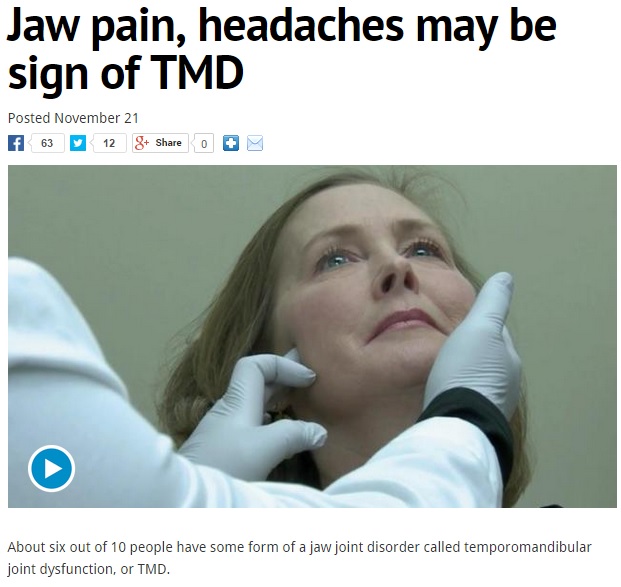In most cases, headaches can easily be resolved by taking an over the counter painkiller. Unfortunately, there are instances when head-splitting headaches occur over a long period of time—years, even. While most people are quick to place the blame on a problem in the cranial area, the fault may lie with the jaw. An article from WRAL.com offers this explanation:
About six out of 10 people have some form of a jaw joint disorder called temporomandibular joint dysfunction, or TMD.
The pain isn’t always just in the jaw itself, so many doctors misdiagnose the problem.
That’s what happened to 53-year-old Allyson Edwards, who saw many doctors about her chronic earaches and tension headaches.
“I have had pain for approximately, I would say, 20 years,” she said.
There is no known direct cause of TMD. Medical experts, however, claim that the risk of developing TMD increases if a person frequently clenches his or her teeth. Other potential causes of the condition include sustaining a heavy blow to the jaw, arthritis, jaw infections, and misaligned teeth. It is most common among people between 20 and 40 years old.
TMD can be difficult to spot immediately, especially if you have never heard of the condition. Fortunately, there are several noticeable symptoms you can look out for. Apart from chronic headaches or jaw pain, symptoms include hearing a clicking or grating sound whenever you open and close your mouth, jaws “locking” from time to time, and swelling along the side of the jaw.
If you have reason to suspect that you have TMD, do not delay seeing a trusted Greenwood dentist like Dr. Richard Gillum. A dentist with experience in dealing with jaw problems will be able to determine if you are suffering from TMD.
In the event that you are diagnosed with TMD, you shouldn’t hang your head. Progress in dental technology has allowed dentists to treat problems with the temporomandibular joints. Simply look for a Greenwood dental practice, like Gillum Dentistry, that offers TruDenta Therapy. In 12 quick sessions, most people report that their condition vastly improved.
During your treatment for TMD, you may want to follow these tips to help ease the discomfort and aid the healing of your jaw:
Ice and Heating Packs
When you catch yourself clenching your jaw, press a heating pad against your jaw. The heat will naturally help the muscles relax. When your jaw becomes painful due to the condition, use an ice pack to numb the area.
Proper Seating Posture
Avoid slouching while you’re seated. The odd angle(s) at which you bend your body can add unnecessary stress on your back and jaw, which can only make the discomfort of having TMD worse.
(Source: Jaw pain, headaches may be sign of TMD; WRAL.com; November 21, 2014)

